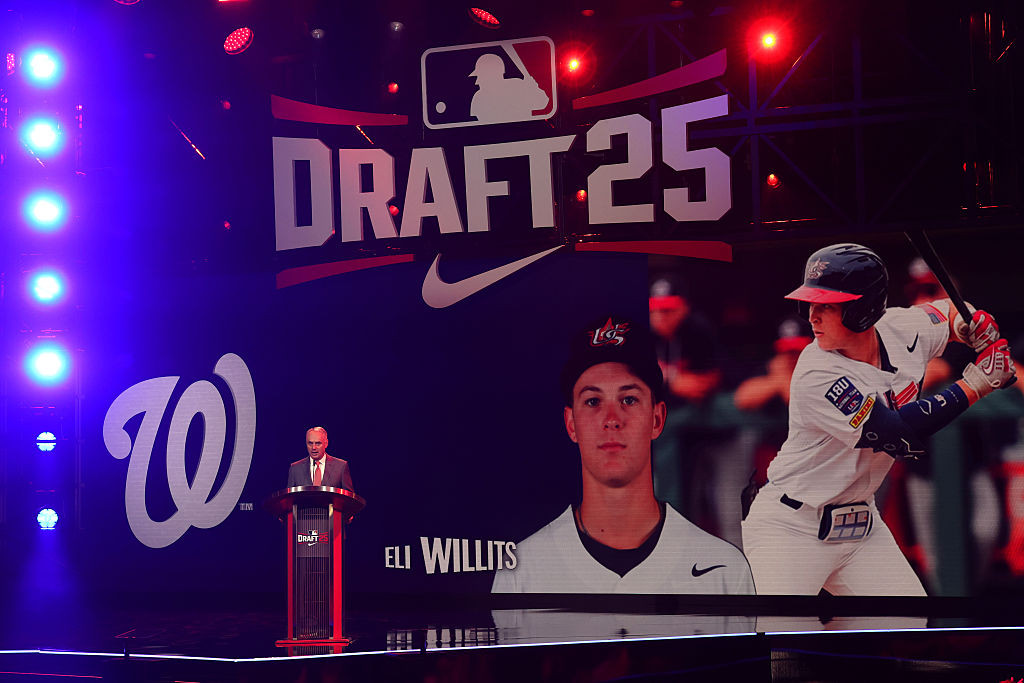The gentlemen in charge of the Nationals’ draft war room Sunday night all made the same point, in their own various words, about the ultimate decision to use the No. 1 pick on Eli Willits. They all were adamant he was the choice, no dissension in the room.
Vice president of amateur scouting Danny Haas: “I think there was general consensus for a while, and it solidified into unanimous toward the end of our process.”
Assistant scouting director/national crosschecker Reed Dunn: “I’m really proud of the work everybody did to come together. And, as Danny said, to make a unanimous decision on somebody we truly believe in.”
Senior director of amateur scouting Brad Ciolek: “We scouted the entire class. We were prepared. And then ultimately when we ended up winning the lottery, we knew exactly who we needed to hone in on, who we needed to do more work on.”
Interim general manager Mike DeBartolo: “It was one of those nice things where the scouts and the analysts see things the exact same way and saw him as the best hitter in the draft, the best fielder in the draft, with just great makeup, great work ethic and all the intangibles. Everything came together, and it was a really collaborative and great process.”
So it was that a No. 1 pick that seemed to surprise the rest of the baseball world was viewed internally as the obvious choice, even among what was supposed to be an unusually wide open pool of potential candidates.
Make no mistake, the Nationals believe Willits was the best all-around player in this year’s draft. He may not have the power potential of Ethan Holliday, but he’s the superior defender at shortstop and has a more well-rounded offensive game. He may not be as close to big-league-ready as Kade Anderson, but the LSU left-hander may not grow into a true ace, while Willits is (eventually) expected to grow into a star shortstop.
There is also the unspoken, but important, point to make about the financial aspect of this whole process. Willits, unlike Holliday and Anderson, is not represented by Scott Boras. That could make him a more plausible candidate to sign a long-term extension some day down the road, but it also could make him more agreeable to an under-slot signing bonus now. The Nats could then use that extra bonus money to sign their third round pick, Mississippi high school right-hander Landon Harmon, who was rated the 49th best player in the draft but slipped to the 80th position because teams were worried he’ll go to college instead of the minors.
DeBartolo spoke in generic terms about deploying such a strategy last week in his first session with reporters since replacing Mike Rizzo.
“We’ll see if we can use dollars strategically to bring in as many top prospects as we can,” he said that afternoon in St. Louis. “I think it’s going to benefit the long term of the organization.”
Let’s be clear: One of the reasons Rizzo is no longer employed is the Nationals’ lack of success in the draft over the last decade. And while a disappointing string of first round picks gets the most attention, the lack of development of later round picks into regular big league players has been just as damaging to the franchise’s overall state of being.
So while Willits drew the headlines Sunday night, and rightfully so, the scouting department was plenty excited about the two other players they drafted: Harmon (who draws comparisons to 2023 third round picks Travis Sykora) and second round pick Ethan Petry (who had one of the best power bats of any of this year’s prospects, even if there are questions about his defensive abilities in the long run).
Ultimately, everyone’s legacies will be built or broken on the fate of Willits’ career. At 17 years, 7 months, he’s the youngest No. 1 overall pick since Ken Griffey Jr. in 1987. He was born Dec. 9, 2007, which means he wasn’t even four months old when Ryan Zimmerman christened Nationals Park with his Opening Night walk-off homer.
The Nats are taking a chance on this young man, but they do so firmly believing they know exactly what they’re getting.
“We started scouting this class before we knew we were picking No. 1,” Dunn said. “We started scouting this class a couple of days after the (2024) draft. And one of the guys who stood out to us was a 16-year-old who was making contact with guys a year to a year-and-a-half older than him at Team USA. He stood out to us. We had a very thorough process getting to know this kid, getting to know his family.”
Like Holliday, Willits is the son of a big leaguer. Reggie Willits didn’t come close to matching Matt Holliday’s playing career, but the former Angels outfielder went on to coach first base for the Yankees and then the University of Oklahoma and knew all along his son had the right stuff to be drafted first in the nation in spite of his young age.
“He was always playing with older kids,” Reggie Willits said. “We knew that he was good, and we knew he had a special gift and a talent.”
There’s still a long way to go, of course. Two years ago, Eli Willits wrote to himself that he wanted to be the No. 1 pick in the draft. He also wrote that he wanted to make his major league debut by age 20.
That means he might not show up in the Nationals’ lineup until late in the 2028 season. That feels like an eternity from now, and who knows what the state of the organization will be by then, whether DeBartolo will be the permanent GM, whether the Lerner family will still own the team, whether CJ Abrams will still be the starting shortstop, whether MacKenzie Gore will have already signed elsewhere as a free agent and whether James Wood will be pondering his own upcoming free agency.
It's going to be years until we know if the Nats made the right choice here. But the apples-to-apples comparison to Holliday in particular will be inescapable. Both were high school shortstops from Oklahoma with fathers who played in the big leagues, drafted the same year, with the Nationals explicitly choosing Willits and allowing Holliday to slip to the Rockies in the No. 4 position.
Someday down the road, we’ll look back at the quotes offered up Sunday night and be reminded the Nats’ front office was “unanimous” in its decision. Will they be proven right?




-1745819772711.png)

